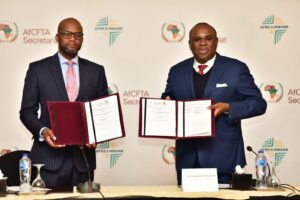
Local Capital is Readily Available for Africa’s Economic Renaissance
By Muoki Musila
Accelerating Investment in Africa
In conjunction with the World Economic Forum (WEF), the African Continental Free Trade Area (AfCFTA) agreement has developed a forward-looking Action Plan to engage the private sector for transformative investment in four key sectors. Rightly so, the AfCFTA understands that engaging the private sector is critical to opening opportunities for investment and developing local, sub-regional, and continental value chains. As AfCFTA focuses on capitalizing on the growing buy-in into its agenda of creating a single African market of 1.3 billion people, there is a need to equally look inward for investment in the local market.
The AfCFTA-WEF white paper is conspicuously populated by international brands, among them Coca-Cola, Yara International, Worldwide Brewing Alliance, and DHL among others which is encouraging. However, the absence of local brands and the glaring lack of local sector engagement in the plan is a concern on the implementation of the plan. There is a substantial reservoir of local capital that the secretariat must focus on to spur a renaissance of the African economy and its development.
Local Funding Partners

The African Investment Forum has been a clear indication of the willingness and presence of funding capabilities to spur investment under the AfCFTA and alternative regional trade blocs. In 2023, the forum generated $34.82 billion in investment for health, agriculture, creative industry, and infrastructure projects. While the forum is global-focused, significant input into the framework has been headlined by Africa’s participation, a testament to the huge potential held.
Africa’s Africa Export-Import Bank, a pan-Africa multilateral financial institution has been at the core of Funding AfCFTA’s implementation agenda to promote intra-and extra-African Trade, signing a $1 billion fund in 2023. The bank’s Pan-Africa Payment and Settlement System (PAPSS) product has been adopted to further headline the implementation of the AfCFTA agenda. Thus, the secretariat and its partners need no invitation to consider the potential available locally for investment in reinvigorating the continent’s economic potential.
“For the AfCFTA to truly realize its transformative potential, it must prioritize local sector engagement and the inclusion of local brands in its Action Plan.”
Africa is not without leading local venture capital and seed stars that are rooting on Africa’s potential, startups, and value chains. In addition to Africa being a host to thriving local businesses, some are propped by several local seed investors who have been funding businesses from inception to acquisition. Nigeria’s Paystack, acquired by Stripe for $200m, for instance, had several Nigerian Investors that demonstrate the potential held in the local scene. Thus, for an African economy that is propped by women and youth-led small and medium-sized businesses, there is a need for investor engagement to drive growth and development.
A New Investment Future
Africa has had a history of local private markets and venture capital defining its growth and investment which will continue to be crucial in alleviating poverty levels in Africa. Agriculture is one of the AfCFTA-WEF target industries that have seen an increase in tech-backed startups that need leveraging to streamline value chains even as foreign companies seek a piece of the cake. The investment ecosystem can be further strengthened through collaboration between local knowledge and international expertise. This is a critical paradigm shift from an African investment landscape that has long been over-reliant on external foreign investment.
For the AfCFTA to truly realize its transformative potential, it must prioritize local sector engagement and the inclusion of local brands in its Action Plan. This can be achieved through targeted efforts to raise awareness among local businesses about the opportunities offered by the AfCFTA and by providing them with the necessary support and resources to participate effectively. Reliance on local investors not only promotes a self-reliant ecosystem but also enhances sustainability while enhancing strong regional integration efforts and intra-trade with a deeper sense of ownership for economic leaps.
The AfCFTA can explore the establishment of a dedicated fund to provide financing and technical assistance to local businesses looking to expand their operations within the AfCFTA framework. This fund could be supported by contributions from both public and private sector stakeholders and could be used to provide grants, loans, and equity investments to eligible businesses.
Robust Investor Protection Mechanisms
The investment landscape will however need a revolution in the existing regulations and a secure operational environment for local private markets and venture capital firms to operate. This is a necessary condition if the AfCFTA, and indeed member states are to attract a broader spectrum of local investors to spearhead to growth of the African economy. The AfCFTA should work closely with local governments and regulatory bodies to create a conducive environment for business growth and investment. This could involve simplifying regulatory processes, reducing bureaucratic hurdles, and providing incentives for local businesses to participate in the AfCFTA and the investment ecosystem and landscape domestically.
As Africa looks to awaken its economic potential by exploring investment opportunities for the private sector, the engagement efforts must equally focus on local capacities. While self-reliance on the aspect is a few years away, the AfCFTA and other players must maintain a long-term perspective in response to emerging investment and intra-African trade needs. This is therefore an invitation for Africa to realize her potential and to take an active role in Africa’s investment growth and development agenda.



